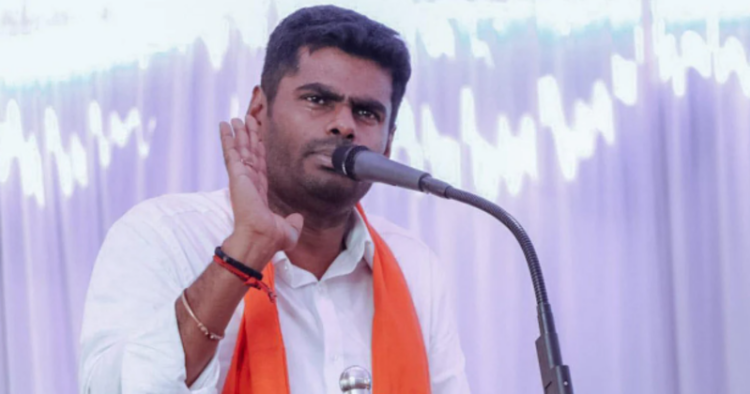In a recent statement, Tamil Nadu BJP president K Annamalai levelled serious accusations against the DMK government, alleging that they have been misappropriating credit for schemes initiated by the Modi-led Central government. Annamalai took to his social media platform, X, to criticise the DMK for their actions, claiming that the state government has been pasting stickers on Central schemes and presenting them as their own.
Annamalai pointed out that the DMK, despite being in power for the past three years, has neither fulfilled its 2021 Assembly election promises nor implemented any new schemes that would benefit the people of Tamil Nadu. He accused the Stalin-led government of focusing solely on advertisements and superficial branding instead of genuine governance.
மத்திய அரசின் திட்டங்களுக்கு ஸ்டிக்கர் ஒட்ட முயலும் திமுக!- அண்ணாமலை https://t.co/IjiRA2uReI #annamalai
— Top Tamil News (@toptamilnews) May 31, 2024
“The Stalin-led government only focuses on advertisements and pasting stickers on Central government schemes,” Annamalai stated. He emphasised that the Chief Minister is projecting initiatives funded and implemented by the union government as achievements of the DMK administration.
Highlighting specific issues, Annamalai noted that the DMK government has not allocated funds for the past two years to support kindergarten classes in schools. Furthermore, he questioned the decision to award Rs 1000 crore worth of contracts for purchasing equipment to set up smart classrooms to a Kerala government-run company, bypassing the state-owned ELCOT (Electronics Corporation of Tamil Nadu Limited).
https://www.instagram.com/p/C7ocS4EypLW/?utm_source=ig_web_button_share_sheet
The allocation of credit for educational advancements in Tamil Nadu has sparked a heated debate between the Central and State governments. BJP leader Annamalai has accused Chief Minister M.K. Stalin of presenting schemes funded by the Central government as initiatives of the state administration.
Annamalai stated, “For developing school education, the Central government sanctioned Rs. 5,858.32 crore to Tamil Nadu in the last three years under the Samagra Shiksha Yojana. However, Mr. Stalin is trying to project the schemes implemented with the Central government’s funds as state government projects.”
Contrarily, Chief Minister Stalin has highlighted significant improvements in the state’s educational infrastructure during the three years of DMK rule. Using his social media platform X, Stalin claimed that the sector has witnessed transformative changes, describing the advancements as a “quantum jump (four-legged leap like a cheetah).”
Stalin emphasized the integration of technology into education, noting that the School Education Department established internet connections in 20,332 state-run schools. Additionally, he mentioned the creation of hi-tech labs costing ₹519.73 crore and the establishment of 22,931 smart classrooms for ₹455.32 crore.
In a Tamil post quoting a circular, Stalin stated, “Out of a total of 37,553 government and aided schools in the state, 20,332 schools have been given internet connections. For the remaining 17,221 government schools, the connection will be established by the second week of June. With the establishment of internet facilities, the teachers, especially in rural pockets, will get respite from regular trips to internet centers to complete school-related works. This has been undertaken keeping in mind the teachers, students, and the importance of internet connectivity in schools.”
Despite these claims, critics argue that Chief Minister Stalin is preoccupied with internal party issues and national political ambitions. They assert that Stalin is focusing on becoming the Prime Minister, while grooming his son, Udhayanidhi Stalin, to succeed him as Chief Minister of Tamil Nadu, thereby continuing family rule.
Further criticism has been directed at the DMK government for allegedly claiming credit for union government-funded schemes such as Jal Jeevan Mission and PM Awas Yojana (PMAY). Critics accuse the state government of misappropriation of funds and inadequate implementation of these projects, such as installing hand pumps and taps without proper underground pipelines, forcing poor residents to pay for water tap connections.




















Comments